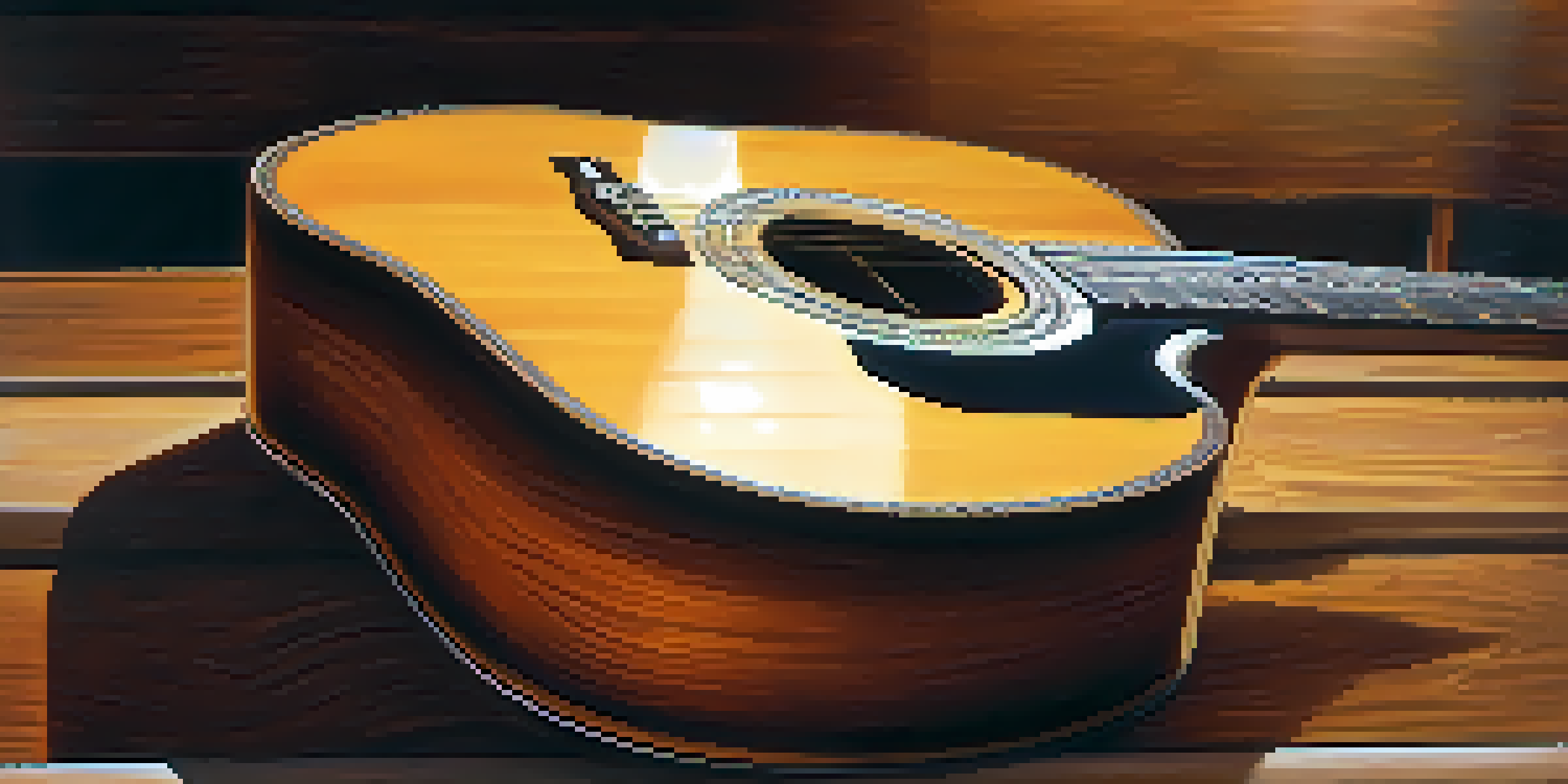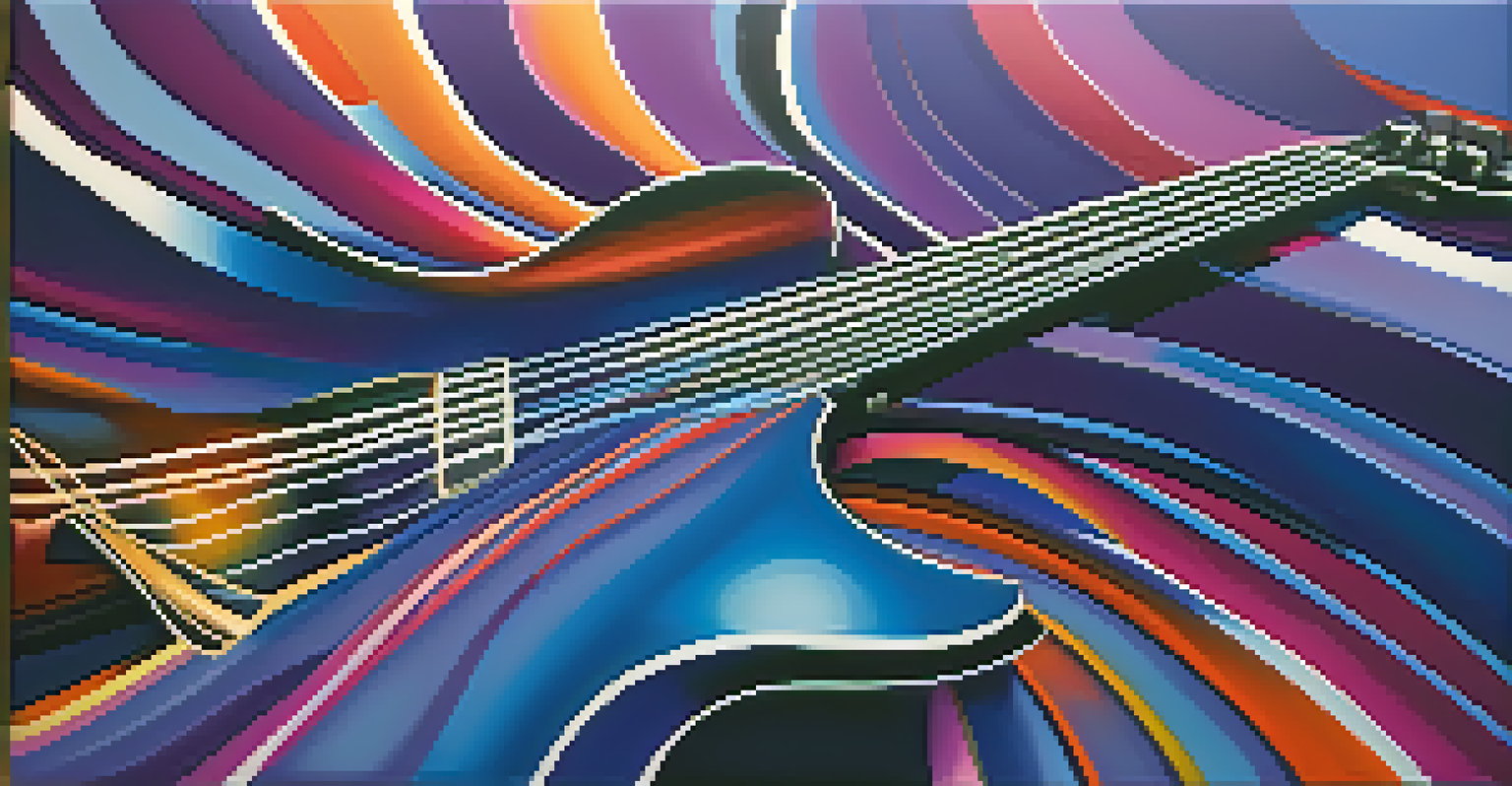Guitar in Pop: Its Role in Shaping Popular Music Trends

The Guitar: A Defining Instrument of Popular Music
The guitar has been a cornerstone of popular music since its rise in the mid-20th century. Its versatility allows it to adapt across genres, from rock to pop, making it a staple in the music industry. Think of iconic artists like Elvis Presley or The Beatles; their guitar-driven melodies defined a generation and set the stage for future musicians. This adaptability has made the guitar not just an instrument, but a cultural symbol of creativity and expression.
The guitar is a small orchestra. It is a miniature symphony.
Moreover, the guitar's accessibility contributes to its ubiquity in pop music. With a range of price points and styles, anyone can pick up a guitar and start making music. This democratization of music creation has fueled a vibrant community of aspiring artists, leading to an explosion of new sounds and trends. As more musicians embrace the guitar, it continues to evolve, ensuring its relevance in contemporary music.
In summary, the guitar's role as a defining instrument in popular music is undeniable. Its adaptability and accessibility have made it a vehicle for artistic expression, influencing countless genres and trends. By fostering a culture of creativity, the guitar remains a vital force in shaping the sound of popular music.
From Rock 'n' Roll to Today: The Guitar's Evolution
The evolution of the guitar in pop music can be traced back to the rock 'n' roll explosion of the 1950s. Artists like Chuck Berry not only showcased the instrument's capabilities but also defined a new cultural movement. Fast forward to the 80s, and the electric guitar became synonymous with hair metal and the birth of rock anthems, cementing its place in pop culture. This historical trajectory illustrates how the guitar has continually shaped and responded to popular music trends.

As we entered the 90s and 2000s, the guitar's presence began to shift again, with the rise of grunge and alternative rock. Bands like Nirvana and Radiohead utilized the guitar in innovative ways, moving away from traditional structures and experimenting with sound. This evolution reflects how the guitar adapts to societal changes, offering a voice to the discontent and creativity of younger generations. Each era brings a new interpretation of the guitar's role, showcasing its versatility.
Guitar's Versatility in Music
The guitar's adaptability across genres has made it a defining instrument in popular music, influencing countless artists and styles.
The guitar's ability to evolve with the times is a testament to its significance in pop music. Whether it's the rebellious spirit of rock 'n' roll or the introspective sounds of indie, the guitar remains a powerful tool for expression. As trends continue to shift, we can expect the guitar to adapt and inspire future musicians, proving that its influence is far from over.
Cultural Movements and the Guitar's Role
Cultural movements have always intertwined with music, and the guitar has played a pivotal role in this relationship. For instance, the folk music revival of the 1960s, led by artists like Bob Dylan, used the guitar as a means of social commentary and activism. Songs became anthems for change, reflecting the desires of a generation seeking justice and equality. In this way, the guitar transcended its musical role to become a voice for societal change.
The beauty of the guitar is that it can be a solo instrument or an accompaniment, and it can be played in any genre.
Similarly, in the punk movement, the guitar embodied rebellion and DIY ethics. Bands like The Ramones and Sex Pistols used simple guitar riffs to convey their message, stripping down music to its raw essence. This approach not only influenced the sound of rock music but also inspired countless other genres, from grunge to emo. The guitar became synonymous with a defiant spirit, encouraging young artists to shake off conventions.
Through these cultural movements, the guitar has solidified its place as a tool for expression and change. Its ability to resonate with the emotions of the times makes it an enduring symbol in pop music. As new movements arise, we can expect the guitar to continue its role in shaping narratives and inspiring creativity.
The Guitar's Impact on Modern Pop Artists
Today, the guitar remains integral to modern pop music, influencing both established and emerging artists. Stars like Taylor Swift and Ed Sheeran have successfully integrated guitar into their sound, appealing to a wide audience while maintaining their artistic integrity. This blend of genres showcases the guitar's versatility, as it can bridge the gap between pop, folk, and even hip-hop. Each strum adds a layer of authenticity to their music, helping to connect with listeners on a personal level.
Furthermore, platforms like YouTube and TikTok have democratized music creation, allowing aspiring artists to showcase their guitar skills and reach global audiences. This new wave of musicians often draws inspiration from traditional guitar-driven genres, infusing them with contemporary elements. As a result, the guitar continues to thrive in the digital age, fostering a sense of community and collaboration among artists and fans alike.
Cultural Influence of the Guitar
Throughout various cultural movements, the guitar has served as a powerful tool for expression and social change, resonating with the emotions of the times.
In essence, the guitar's impact on modern pop artists is profound. Its ability to blend with various genres and resonate with audiences keeps it relevant in today's music landscape. As new artists emerge and redefine the sound of pop, the guitar will undoubtedly remain a key player in shaping the future of popular music.
The Role of Technology in Guitar Music
Technology has dramatically transformed the way we create and experience guitar music. With the advent of digital recording and production tools, musicians can experiment with sound in ways previously unimaginable. Software like GarageBand or Logic Pro allows artists to layer guitar tracks, manipulate effects, and create intricate compositions from the comfort of their homes. This shift has opened up new avenues for creativity, making it easier for musicians to produce high-quality music without the need for a traditional studio.
Moreover, social media platforms have changed how guitarists connect with their audience. Artists can now share their music, tutorials, and performances in real-time, building a global community of fans and fellow musicians. This accessibility has led to the rise of guitar influencers, who inspire others to pick up the instrument and explore their creativity. The impact of technology on guitar music is evident, as it fosters collaboration and experimentation like never before.
In summary, technology plays a crucial role in the evolution of guitar music. From recording techniques to social media outreach, it has reshaped the landscape for both aspiring and established artists. As technology continues to evolve, the guitar will likely adapt, ensuring its place in the future of popular music.
Guitar Genres Influencing Pop Music Today
Various guitar genres have significantly influenced the sound of contemporary pop music. For instance, the resurgence of indie rock has introduced a more laid-back, yet intricate guitar sound into mainstream pop. Artists like Billie Eilish and Hozier often utilize melodic guitar lines that add depth to their songs, creating a distinct atmosphere that resonates with listeners. This blending of genres showcases the guitar's ability to weave itself into various musical textures.
Additionally, the rise of genres like R&B and hip-hop has seen the guitar taking on new roles. Artists such as Khalid and Anderson .Paak incorporate guitar riffs and rhythms into their tracks, adding a fresh element to their sound. This fusion of styles not only broadens the appeal of guitar music but also reflects changing musical tastes and trends. The guitar continues to be a versatile instrument that transcends traditional boundaries.
Future Innovations in Guitar Music
As genres continue to blend and live music gains renewed appreciation, the guitar is set to remain a central instrument in the evolving landscape of popular music.
Ultimately, guitar genres play a vital role in shaping contemporary pop music. By influencing musical styles and trends, the guitar remains a key instrument that artists can rely on for creative expression. As new genres emerge and evolve, the guitar will undoubtedly continue to inspire and innovate in the world of pop music.
The Future of the Guitar in Popular Music
Looking ahead, the future of the guitar in popular music appears bright, with plenty of opportunities for innovation and creativity. As genres continue to blend and evolve, the guitar will remain a central instrument in shaping new sounds. Emerging artists are already experimenting with unconventional tunings, effects, and techniques, pushing the boundaries of what guitar music can sound like. This spirit of exploration will likely lead to exciting new trends in the years to come.
Moreover, the resurgence of live music post-pandemic has renewed appreciation for musicianship, particularly guitar playing. Audiences are eager to experience the raw energy of live performances, where the guitar often takes center stage. This renewed interest may inspire a new generation of guitarists to embrace the instrument, leading to an influx of talent and creativity in the music scene. The guitar, once again, becomes a beacon of expression and connection.

In conclusion, the future of the guitar in popular music is poised for growth and transformation. As artists continue to innovate and audiences seek authentic musical experiences, the guitar will undoubtedly remain a timeless instrument that shapes the sound of tomorrow. Its role in popular music is far from static; rather, it is a dynamic force that will evolve with the culture and creativity of each new generation.